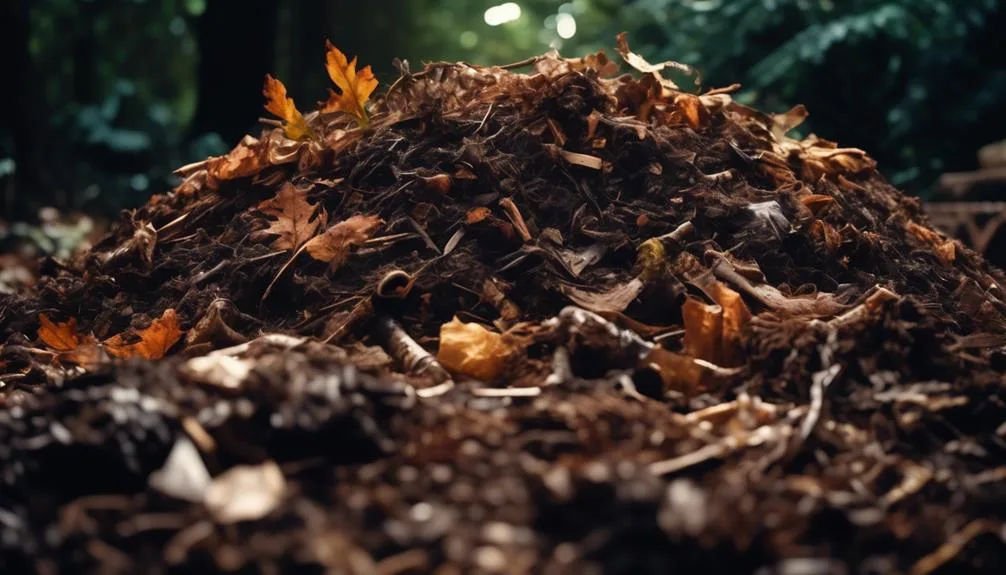Wondering if redwood bark is good for composting? Let's consider its potential benefits and any drawbacks.
Adding the earthy scent of redwood bark to your compost pile can be intriguing. We'll explore whether it's a valuable addition to your composting routine, offering a deeper understanding of its potential.
Redwood Bark Composition
Redwood bark, a key component of many composting mixtures, consists of a blend of organic materials such as lignin, cellulose, and tannins, contributing to its rich and earthy composition.
When used in composting, redwood bark provides a balanced carbon-to-nitrogen ratio, aiding in the decomposition process. Its fibrous nature allows for adequate aeration, promoting the growth of beneficial microorganisms essential for breaking down organic matter.
The moisture levels of redwood bark are crucial in maintaining an optimal environment for decomposition. It helps retain moisture without becoming waterlogged, ensuring that the compost pile remains aerated and moist, which is conducive to the breakdown of organic materials.
With its ability to regulate moisture and provide essential nutrients, redwood bark is a valuable component in creating nutrient-rich compost for your garden.
Redwood Bark Benefits for Composting
With its exceptional composition and moisture-regulating properties, redwood bark offers numerous benefits for composting, enhancing the decomposition process and contributing to nutrient-rich garden soil.
When used as a composting material, redwood bark provides several advantages:
- Nutrient Enrichment: Redwood bark breaks down slowly, releasing nutrients gradually into the compost. This contributes to the overall enrichment of the compost, providing essential elements for plant growth and soil health.
- Soil Amendment: As redwood bark decomposes, it improves soil structure, aeration, and water retention. This amends the soil, creating a more conducive environment for beneficial microorganisms and plant roots.
- Environmental Impact and Sustainable Sourcing: Redwood bark is often sourced from sustainable forests or obtained as a byproduct of lumber production, making it an environmentally friendly choice for composting material.
These benefits make redwood bark a valuable addition to composting processes, promoting sustainable gardening practices and healthy plant growth.
Redwood Bark Drawbacks for Composting
Considering the composting process, it's important to be aware of some potential drawbacks associated with using redwood bark as a composting material.
While redwood bark is excellent for moisture retention, it can also be a double-edged sword. The high moisture retention capability of redwood bark can lead to overly wet compost, which may hinder the decomposition process and cause unpleasant odors.
Additionally, redwood bark takes a longer time to break down compared to other composting materials, which can slow down the overall composting process.
When used as a soil amendment, redwood bark's slow decomposition may not provide immediate benefits to the soil.
Therefore, it's crucial to consider these drawbacks and use redwood bark judiciously in composting, ensuring proper balance and monitoring of moisture levels.
How to Use Redwood Bark in Composting
To incorporate redwood bark into your composting process effectively, consider its moisture retention capabilities and slow decomposition rate as you aim to strike a balance for optimal results.
Using redwood bark as a mulch in gardens can significantly benefit your composting efforts. Here's how to use redwood bark in composting:
- Layering: Place a thin layer of redwood bark between compost layers to aid in moisture retention and slow decomposition.
- Aeration: Mix redwood bark into the compost to improve airflow and prevent compaction.
- Soil health: As the redwood bark decomposes, it promotes soil health and fertility by releasing essential nutrients into the compost.
Tips for Composting With Redwood Bark
Maximize the benefits of redwood bark in your composting process with these practical tips for improving moisture retention and promoting healthy soil.
When using redwood bark in your compost, consider using smaller pieces to aid in faster decomposition. This allows for better aeration and helps create a balanced environment for decomposition.
Additionally, layering the redwood bark with other compost materials like kitchen scraps and yard waste can enhance the overall composting process. Mixing the redwood bark thoroughly with other organic materials will optimize the composting techniques and ensure that the bark breaks down effectively.
The rich nutrients from the redwood bark will contribute to soil enrichment, promoting a healthy and fertile environment for your plants.
Conclusion
Incorporating redwood bark into your compost pile can enhance soil quality over time, despite its slower decomposition rate. Its nutrient-rich properties and soil-enhancing benefits make it a valuable addition for creating a thriving garden.
Consider the balance and techniques required, and witness the transformation it brings to your gardening endeavors.

My interest in trees started when I first saw the giant sequoias in Yosemite.
I was a teenager then, and I remember thinking, “I need to learn more about this.”
That moment stuck with me.
A few years later, I went on to study forestry at Michigan Tech.
Since graduating, I’ve worked in a mix of hands-on tree care and community education.
I’ve spent over ten years helping people understand how to plant, maintain, and protect the trees in their neighborhoods.
I don’t see trees as just part of the landscape.
They are living things that make a real difference in our daily lives.
